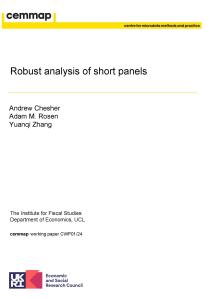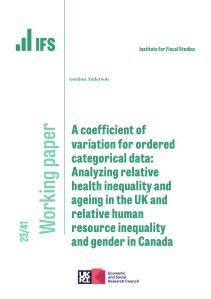We develop an approach to valuing non-market goods using nonparametric revealed preference analysis. We show how nonparametric methods can also be used to bound the welfare effects of changes in the provision of a non-market good. Our main context is one in which the non-market good affects the marginal utility of consuming a related market good. This can also be framed as a shift in the taste for, or quality of, the market good. A systematic approach for incorporating quality/taste variation into a revealed preference framework for heterogeneous consumers is developed. This enables the recovery of the minimal variation in quality required to rationalise observed choices of related market goods. The variation in quality appears as a adjustment to the price for related market goods which then allows a revealed preference approach to bounding compensation measures of welfare effects to be applied.
Authors

Laura Blow

CPP Co-Director
Richard is Co-Director of the Centre for the Microeconomic Analysis of Public Policy (CPP) and Senior Research Fellow at IFS.
Journal article details
- DOI
- 10.1007/s10640-018-0229-9
- Publisher
- Springer
- Issue
- Volume 69, Issue 3, March 2018, pages 503-527
Suggested citation
Blow, L and Blundell, R. (2018). 'A Nonparametric Revealed Preference Approach to Measuring the Value of Environmental Quality' 69(3/2018), pp.503–527.
More from IFS
Understand this issue

Gender norms, violence and adolescent girls’ trajectories: Evidence from India
24 October 2022

The £600 billion problem awaiting the next government
25 April 2024

Public investment: what you need to know
25 April 2024
Policy analysis

ABC of SV: Limited Information Likelihood Inference in Stochastic Volatility Jump-Diffusion Models
We develop novel methods for estimation and filtering of continuous-time models with stochastic volatility and jumps using so-called Approximate Bayesian Compu- tation which build likelihoods based on limited information.
12 August 2014

Assessing the economic benefits of education: reconciling microeconomic and macroeconomic approaches
This CAYT report discusses the strengths and limitations of several approaches to assessing the effect of education on productivity.
14 March 2013

Misreported schooling, multiple measures and returns to educational qualifications
We provide a number of contributions of policy, practical and methodological interest to the study of the returns to educational qualifications in the presence of misreporting.
1 February 2012
Academic research

Understanding Society: minimising selection biases in data collection using mobile apps
2 February 2024

Robust analysis of short panels
8 January 2024

A coefficient of variation for ordered categorical data: Analyzing relative health inequality and ageing in the UK and relative human resource inequality and gender in Canada
21 December 2023